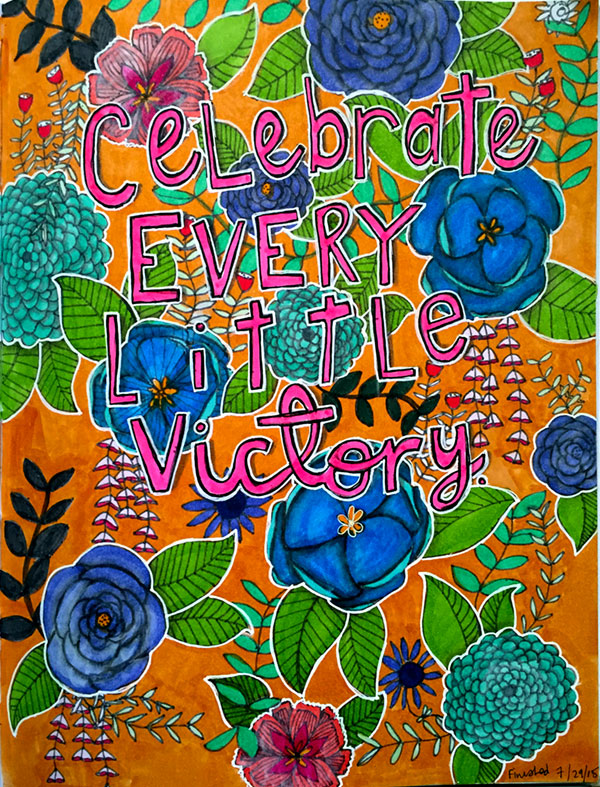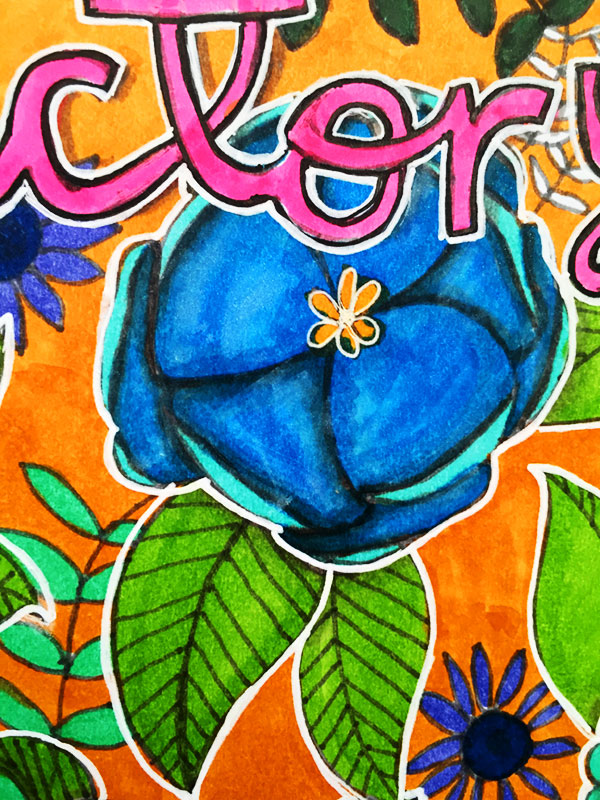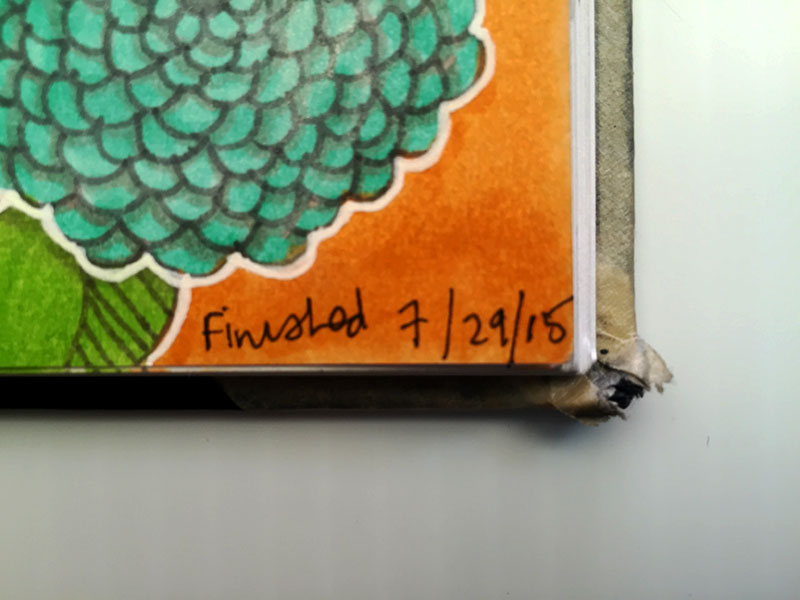One thing I thought, when I was told I'd have to be off my feet for over a month, was, "Maybe I'll get a lot of art done!"
But three weeks in, my down time dwindling, I hadn't done much more than a journal page with markers and collage. A large canvas sat unpainted, stacks of half-finished works piled up, and my sketchbook hadn't magically become filled with all kinds of exciting ideas like I thought it would.
And as I sat there, lamenting my lack of art making and wondering if I was really as passionate about making it as I thought (because wouldn't I be doing it all the time if I were?), I remembered a recommendation a friend had made - watch the two seasons of Work of Art.
I found them on YouTube and set my Roku to auto play them.
--
My current canvas in progress.
A couple of months before breaking my foot, I was consumed by work.
I knew making the decision to work full-time in retail would mean less time to be social. I've had Fibromyalgia and a host of comorbid diseases and syndromes, such as chronic fatigue syndrome (now known as systemic exertion intolerance disease) since I was fourteen years old. The next year, I got my first job, and worked steadily until my junior year of college. That was the year of my cancer scare and emergency surgery, when my body seemed to start attacking itself, putting me into a whole lot of pain. Things that used to be tolerable, such as walking a few blocks to the train station, became gauntlets of pain and required a day of recovery. My best friend at the time seemed to thrive despite surgeries and pain and health issues, and my dispair grew - how come she seemed to bounce back and I was only getting worse.
(I honestly don't know if she did bounce back; after college we drifted, and I'm sure my internal jealousy soured our friendship. Something I regret.)
Since that fateful year, I've worked intermittently in various positions, from temp work to Barnes and Noble to Starbucks. It was at the last place that I began to push my body in order to cover bills, and I soon crossed that 30 hour a week threshold.
I remember crouching in a corner because of a migraine, remember working with a broken finger, remember laying on my parents' bed, my body consumed by pain, unable to do anything but think and talk (and even that went as the hours piled up).
Working a traditional job, for me, meant work and pain and sleep. There was no room for anything else.
--
Here's what the original plan was: work 25 hours a week in order to pay my rent and basic expenses and supplement with art. I'd have more than enough free time to keep doing art and making videos and all the like, but wouldn't have to depend on my art & creativity to pay the bills.
I didn't want to anymore. I have always striven to create meaningful and insightful classes, create artwork that would resonate with others, and play in my journals as much as possible. But I never could take the stress of putting myself out there; I'd be happier to just make stuff and post it online and let it find its audience. Marketing is hard for me, especially with my anxiety disorder always sitting next to me, and having to sing for my supper soured a lot of the joy I originally got from creating. Talk to any of my friends in the industry and they'll nod knowingly to this statement: Samie is always trying to attract students, but never can get the numbers they do. It hasn't happened. I've watched as former students & readers surpass me in terms of reach and success and grew bitter.
Really, really bitter.
So bitter, in fact, that I decided to just give up.
--
My first week at Target was 25 hours. The next, 28. I was sure my body would give out during the next shift, after the next week.
But it didn't. Soon, I was working full 8 hour shifts and still able to remain upright when I clocked out. I slowly began adding to my social life as I discovered my limits. I'd work and visit and go out and do things. Each day was a gift -- I found such joy in just being able to work, I often befuddled coworkers when I expressed joy at doing anything, like zoning shoes for 8 straight hours. After ten years of pain and sacrifice, I was finally doing the one thing I'd always wanted: living.
I just wasn't doing art.
I'd be tired when I came home, or need to decompress. I dove into TV shows and Netflix, sometimes doodling but mostly skimming Facebook and Tumblr as I let my mind relax. I read a lot. I hung out with friends and family. I made new friends.
And I took on more hours to not only pay the rent and basic bills, but to be able to do fun things like go tubing with my family or hit the movies with friends.
I no longer needed to make art to supplement my income.
--
Some days, this list gets me through!
One thing I heard often after detoxing from narcotics and leaving the hospital was give it time. Not everything would happen right away. I needed to take time to heal, to figure out who I was under all the medication. My depression and anxiety, dampened by the pills for twelve years, roared loudly and required lots of time alone with my thoughts to figure out how to navigate. I went to support groups and learned positive self-talk (still hanging above my desk), adjusted my medications, and thought I needed to dive right back into art to make my living.
I over-corrected, I think. In hindsight, I should have done art for me rather than think I had to get back to work. But when you have a chronic illness and can't do much, you begin measuring yourself against what society considers productive. When you don't measure up, you begin to get down on yourself and push through the pain to do something. I needed to make money. I needed to be productive.
I really needed to just be. But that can be the hardest thing to do.
Here's something I suggest: Don't share something you've made online when depressed unless you want to obsess over numbers and likes and comments. Because you will. You'll check back. You'll measure your self-worth against all those little icons and numbers on social media. And when you do make something that gets attention, you'll try to recreate that over and over again because people are paying attention.
But that won't help. You need the right kind of attention. And you won't get that from strangers hitting like. Texting close friends, calling people you trust, that is where you'll get what you need.
--
I kept working. Adding on hours. Staying late, coming in on my days off. Not resting when I should. Ignored my body. Got a tattoo. Stopped going to church every week.
I was happy. I loved - and still do! - my job. The people, the way I was never bored, the responsibility I was given. I was part of something bigger than myself. I was doing it! All that stuff I was afraid of, all that stuff I didn't think I'd ever be able to do - I was doing every single thing and couldn't believe it. I lived in a constant state of amazement and wanted to see how far I could go.
And then I felt some pain in the top of my foot. It spread to my toe. It had to be a broken toe, right? Except I hadn't stubbed it, or dropped anything on my foot, or really done anything to warrant the pain. I figured it would go away.
Several days went by. I was limping pretty badly that last shift, miserable and in a lot of pain. Looking back, I was a total idiot.
I worked for 8 days after the pain started. My friends pressured me to go to the urgent care to get my foot looked at after I texted that I didn't even want to get out of bed, the pain was so bad.
Three days later, I had a cast on my foot and a month of no weight bearing.
--
Here's the genius of the show Work of Art: you got to see how artists got from concept to final piece. They'd do their little confessional to-the-camera parts to fill in the gaps here and there, but mostly, you saw them working through different ideas, refining them as they asked for advice from the other artists or input from their mentor.
You learned why they added elements. You were told the emotions and reasons behind each decision. You learned how to really work through an idea -- how to use a sketchbook, how to jump out of your comfort zone, how to take abstract ideas and birth them into the world.
As someone who didn't take any art classes in high school and college, the experience of watching the show was eye-opening. It completely changed how I approach art. All of it. I'm a stronger and better artist because of it.
Finally, finally, after months and months away, I pulled out my paints and began to play.
--
When I'm in the flow of it, I love every single mark I make, every color mixed on the canvas. There's a feeling that comes over me when I finish a piece or page in my journal; I hold it in my hands and really look at it, marveling at the fact that I made this. I remember when my students' eyes would light up as they tied the last knot on hand-bound journals. I live for inspiring that in others.
There's magic and deep joy in that moment that makes all that lead up to it worth it. All the frustration and hours practicing and late nights are memories colored with the amber of joy, negativity re-written by the power of our own creation.
"Light and dark and inbetween"
"Flowers bring joy to banish the clouds"
I cried when I painted these two pieces. So much came out of me - the doubt and fear and frustration. All my anxiety and depression and hurt foot-ness. As I worked, I realized I wanted to express what all this felt like, attempt to capture the very abstract idea of mental health and chronic illness. I had a clear idea of what I wanted to paint. There was still quite a bit of intuition, but it was being gently guided by a stronger and more resilient heart.
After all those months of not creating, after weeks of being isolated from the world I'd created for myself, I no longer doubted my own heart.
Giving up on art - truly and completely abandoning it - would have drilled a hole in the little boat of life floating on the great ocean we call life. A hole that would never be plugged, lest in unhealthy ways, and one that would have ultimately sunk me.
Sometimes, we need to get our inner landscape straightened out before we can start manifesting it out in the world. No matter how you choose to be creative - painting, writing, cooking, cutting hair - the mind requires times to figure things out before we can get to work. A lot of being creative is absorbing the world around you and letting it simmer in your mind along side opinions, beliefs, and other inspiration. That simmering takes time, and no one can predict how much you'll need to let things come together naturally.
So you have to prime the pump. Do something creative every day. This isn't a new or revolutionary idea, but it is one I'm newly committed to. I started my artful journey by drawing every day, and I need to get back in touch with my roots. You don't need to do anything big - doodle, color, take photographs - but sitting down and making the commitment lets your mind and Lady Inspiration know you're ready and willing.
Let your mind wander. Laugh more. And stop worrying about your art. Don't worry about the quantity or quality or likes or whatever else hangs you up. Instead, get in touch with yourself. What is important to you? What makes your experience of this world unique? How are you impacted - positively or negatively - by your health, family, or past?
How can you touch another's very soul?
We each are a unique looking glass into a shared experience. Chances are, someone else is struggling with the very thing that vexes you. Years ago, I created a page in my art journal that expressed my pain and frustration with FMS. Do you know how many people have commented about it? How many others said, "This is what it's like!" I even had a professor ask to use it in his class as a visual aid so his students could better understand the disease.
This is the art we need to make. And this is how we need to think on it when we get out our tools and sit down to work. When fueled in such a way, nothing matters but reaching out into the void and spreading comfort, joy, and shared experiences.
I tried to give up on art. Deny the joy of my soul because I wasn't living up to what I thought being an artist looked like.
Art simply decided not to give up on me.
"Shine like the star you are"
Eta: I'm just getting back to work but still need a little help. If you can spare even $5, that would be so so helpful. I don't have full rent (but my roommate is amazing and will work with me) and have bills due...I'll be back on track with my next paycheck. Anyway, if you can help, I'd be super grateful.




















